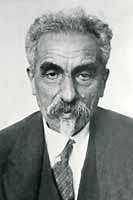Nikolai Marr
Nikolai Yakovlevich Marr (Russian: Никола́й Я́ковлевич Марр, Nikolay Yakovlevich Marr; Georgian: ნიკოლოზ იაკობის ძე მარი, Nikoloz Iak'obis dze Mari; 6 January 1865 [O.S. 25 December 1864] – 20 December 1934) was a Georgia-born historian and linguist who gained a reputation as a scholar of the Caucasus during the 1910s before embarking on his "Japhetic theory" on the origin of language (from 1924), now considered as pseudo-scientific,[1] and related speculative linguistic hypotheses.
Nikolai Marr | |
|---|---|
 Nikolai Marr, circa 1930s | |
| Born | Nikolai Iakobis dze Mari 25 December 1864 |
| Died | 20 December 1934 (aged 69) Leningrad, Russian SFSR, USSR |
| Known for | Japhetic theory |
Marr's hypotheses were used as a rationale in the campaign during the 1920–30s in the Soviet Union of introduction of Latin alphabets for smaller ethnicities of the country. In 1950, the "Japhetic theory" fell from official favour, with Joseph Stalin denouncing it as anti-Marxist.
Biography
Marr was born on 25 December 1864 in Kutaisi, Georgia (then part of the Russian Empire).[2] His father, James Murray (phonetically adapted: Marr), was a Scot and was 71 at the time of Marr's birth, and his mother was a young Georgian woman (Agrafina Magularia).[3] James Marr founded the botanical garden of Kutaisi. Marr's parents spoke different languages (James spoke English and Agrafina spoke the Gurian dialect of Georgian), and thus could hardly understand each other.[4] Having graduated from the St Petersburg University, he taught there beginning in 1891, becoming dean of the Oriental faculty in 1911 and member of the Russian Academy of Sciences in 1912. Between 1904 and 1917 he undertook yearly excavations at the ancient Armenian capital of Ani.[5]
After a visit to Turkey in 1933 Marr developed influenza, followed several months later by a stroke. He died from complications of these ailments in Leningrad on 20 December 1934.[6][7]
Japhetic theory
Marr gained recognition with his Japhetic theory, postulating the common origin of Caucasian, Semitic-Hamitic, and Basque languages. In 1924, he went even further and proclaimed that all the languages of the world descended from a single proto-language which had consisted of four "diffused exclamations": sal, ber, yon, rosh. Although the languages undergo certain stages of development, his method of linguistic paleontology claims to make it possible to discern elements of primordial exclamations in any given language. One of his followers was Valerian Borisovich Aptekar, and one of his opponents was Arnold Chikobava.
Publications
Selected works:
- Nikolai Yakovlevich Marr, Vardan (Aygektsi) (1899). Collections of proverbs Vartan: Izslѣdovanіe. Type. Imp. akademii Sciences.
- Nikolai Yakovlevich Marr (1910). Chanskago Grammar. Type. imp. Akademіi Sciences. p. 240.
- Jah Gato , Nikolai Yakovlevich Marr (1932). Amran. The Academy. p. 162.
- Nikolai Yakovlevich Marr (1932). Tristan and Isolda: love of the heroine of feudal Europe to the matriarchal goddess Afrevrazii. Publishing House of the Academy of Sciences of the USSR. p. 286.
- Nikolai Yakovlevich Marr, Valerian Borisovich Aptekar (1934). Language and Society. State Academy of the History of Material Culture.
- Nikolay Yakovlevich Marr, Valerian Borisovich Aptekar (1936). Collected articles. Power to the Soviets. p. 207.CS1 maint: uses authors parameter (link)
- Nikolai Yakovlevich Marr (1940). Description of the Georgian manuscripts of Sinai Monastery. Publishing House of the Academy of Sciences of the USSR. p. 276.
References
- See e.g. В.М.Алпатов "Марр, марризм и сталинизм"
- Tolz 1997, p. 89
- Rayfield 2015
- Clark 1995, p. 216
- Marr, Nicolas (2001). Ani - Rêve d'Arménie. Anagramme Editions. ISBN 978-2-914571-00-5.
- Tolz 1997, p. 96
- Slezkine 1996, p. 852
Bibliography
- Nicholas Yacolevich Marr 2001. Ani (with forewords by Jean-Pierre Kibarian and Parouyr Mouradi), Anagramme Ed.(Paris), (reprint).
- Большая советская энциклопедия / гл. ред. О. Ю. Шмидт. - Москва : Советская энциклопедия, 1926-. - 26 см. Т. 38: Маммилярия - Мера стоимости. - 1938. - (416) с., (19) л. ил., портр., факс. : ил., карты, портр., табл./ С. 261–264
- Clark, Katerina (1995), Petersburg, Crucible of Cultural Revolution, Cambridge, Massachusetts: Harvard University Press, ISBN 978-0-67-466335-0
- Hirsch, Francine (2005), Empire of Nations: Ethnographic Knowledge and the Making of the Soviet Union, Ithaca, New York: Cornell University Press, ISBN 978-0-80-148908-2
- Rayfield, Donald (16 March 2015), Nikolai Marr - a talk by Donald Rayfield 17 February, British Georgian Society, retrieved 4 October 2015
- Slezkine, Yuri (Winter 1996), "N. Ia. Marr and the National Origins of Soviet Ethnogenetics", Slavic Review, 55 (4): 826–862, doi:10.2307/2501240
- Tolz, Vera (1997), Russian Academicians and the Revolution: Combining Professionalism and Politics, New York City: St. Martin's Press, ISBN 978-0-312-17480-4
- Tolz, Vera (2005), Russia’s Own Orient: The Politics of Identity and Oriental Studies in the Late Imperial and Early Soviet Periods, Oxford: Oxford University Press, ISBN 978-0-19-959444-3
- Velmezova, Ekaterina (2007), Les lois du sens: la sémantique marriste (in French), Bern: Peter Lang, ISBN 978-3-03911-208-1
External links
| Wikimedia Commons has media related to Nicholas Marr. |